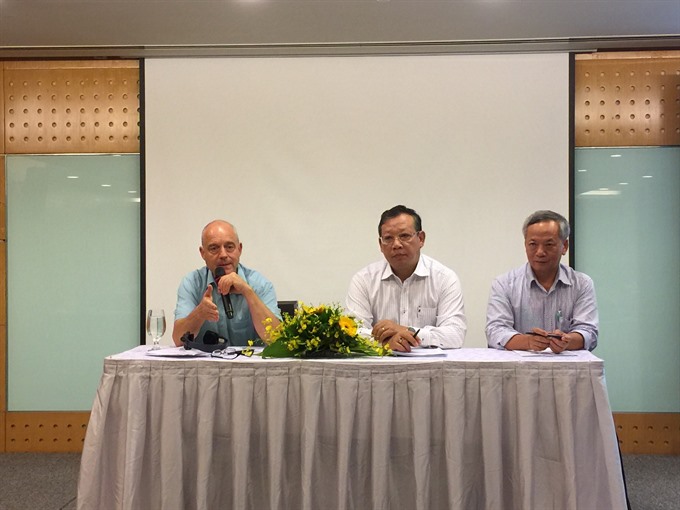 Society
Society

Việt Nam has policies to help expand the cultivation of biotech corn, but the cultivation area for the crop remains modest, according to the Crop Production Department.
 |
| Delegates discuss the impact of biotech crops at a seminar held in HCM City on September 8. — VNS Photo |
HCM CITY — Việt Nam has policies to help expand the cultivation of biotech corn, but the cultivation area for the crop remains modest, according to the Crop Production Department.
Speaking at a seminar on Friday on the economic and environmental impact of biotech crops globally and potential benefits from the adoption of biotech crops in Việt Nam, Trần Xuân Định, the department’s deputy director, said the area under corn cultivation in Việt Nam has reached 1.17 million hectares, of which 100,000ha was for genetically modified corn.
Hybrid corn varieties dominate fields in Việt Nam.
Average corn productivity was low at 4.5 tonnes per hectare, he said, adding that with high production costs and low yields, domestic corn is unable to compete with imports.
Currently, domestic corn meets about 40-50 per cent of market demand, with corn import volume increasing significantly in the past years, he said.
Though the Government has policies to encourage farmers to shift low-productivity rice land to corn or soybean, the low profits from corn cultivation have discouraged farmers.
To get even in production, average corn productivity must reach at least 5 tonnes per ha, Định said.
This requires the corn sector to have measures to raise productivity and cut back production costs and raise the income of farmers, he told the seminar held by the International University - Việt Nam National University HCM City.
The sector needs to map out a plan to put GM corn in production at localities, as well as develop links in production and consumption of the product.
The use of modern bio-technologies in agricultural production has significantly helped farmers around the world improve productivity and profitability, delegates said.
Graham Brookes from the UK’s PG Economics Ltd, a specialist provider of advisory and consultancy services to agriculture and other natural resource-based industries, said the commercialisation of GM crops has occurred at a rapid rate in the past 20 years.
GM crop technology has had a significant positive impact on global gross farm income, which amounted to US$15.5 billion in 2015. This is equivalent to having added 5.2 per cent to the value of global production of the four main crops of corn, canola, cotton and soybeans.
From 1996 to 2015, gross farm income has increased by $167.7 billion, he said.
These gains have been divided 49 per cent to farmers in developed countries and 51 per cent to farmers in developing countries.
About 72 per cent of the gains have derived from yield and production gains with the remaining 28 per cent coming from cost savings, he said.
The adoption of biotech crops has also contribute to reduce green house gas emissions due to reduced fuel use (less spraying and soil cultivation) and decreased the environment impact with a reduction in herbicide and insecticide use.
Talking about the potential impact from the adoption of corn hybrid seeds with biotech traits in Việt Nam, he said the total economic boost to the rural economy could be $16.9 million per year in the worst scenario, if 20 per cent of the corn crop in Việt Nam used biotech corn.
Biotech corn would help farmers increase output to meet growing demand from the feed sector and improve balance of payments, he said. — VNS